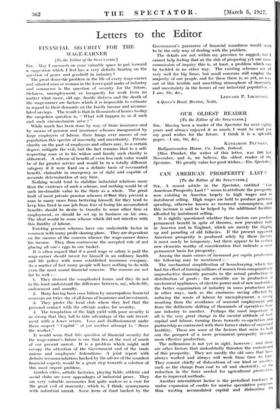Letters to the Editor
FINANCIAL SECURITY FOR THE WAGE-EARNER
[To the Editor of the SPECTATOR.] SIR,- May I encroach on your valuable space to put forward a suggestion which 1 feel has a very definite bearing on the question of peace and goodwill in industry?
The great domestic problem in the life of every wage-earner and salaried man or woman in the lower-paid ranks of industry and commerce is the question of security for the future. Sickness, unemployment or incapacity for work from no matter what cause, old age, family distress and the death of the wage-earner are factors which it is impossible to estimate in regard to their demands on the family income and accumu- lated savings. The result is that in thousands of homes to-day the unspoken question is, " What will happen to us if such and such circumstances arise ? "
While much has been done by way of State insurance and by means of pension and insurance schemes inaugurated by large employers of labour, there hangs over masses of our population this spectre of insecurity and uncertainty. Private charity on the part of employers and others may, to a certain degree, mitigate the evil, but the fact remains that to a self- respecting man or to his widow and family such charity is abhorrent. A scheme of benefit of even less cash value would be of far greater service and would be in a totally different category if it were fixed on a definite basis of covenanted benefit, claimable in emergency as of right and capable of accurate determination at any time.
Nothing would tend to stabilize industrial relations more than the existence of such a scheme, and nothing would be of such inestimable value to the State as a whole. The great fault of most private pension schemes iOthat they prevent a man in many cases from bettering himself, for they tend to keep him fixed in one job from fear of losing his accumulated benefits should he desire to transfer to some other firm or employment, or should he set up in business on his own.. The ideal would be some scheme which did not interfere with this fluidity of labour.
Existing pension schemes have one undesirable factor in common with many profit-sharing plans. : They are dependent on the success of the concern whence the wage-earner draws his income. They tints contravene the accepted rule of not placing all ones eggs in one basket.
It is often argued that if a good wage or salary is paid the wage-earner should invest for himself in an ordinary health and life policy with some established insurance company. As a matter of fact many people will have nothing to do with even the most sound financial concern. The reasons are not far to seek :- 1. They distrust the complicated forms, and they do not in the least understand the difference between, say, whole-life, endowment and annuity.
2. Many having been once bitten by unscrupulous financial concerns are twice shy of all forms of insurance and investment.
3. They prefer the local club where they feel that the personal contact with the officials makes for security.
4. The temptation of the high yield with poor security is so strong that they fail to take advantage of the safe invest- ment with a lower return. Loss and disillusionment make them suspect " Capital " of yet another attempt to " fleece the worker."
It would seem that this question of financial security for the wage-earner's future is one that lies at the root of much of our present unrest. It is a problem which might well occupy the attention of the Government and of the trade unions and employers' federations. A joint report with definite recommendations backed by the advice of the soundest financial experts would be a great step towards a solution of this most urgent problem.
Garden cities, artistic factories, playing fields, athletic Lad social clubs are mere appendages of industrial peace. They are very valuable accessories but quite useless as a cure for the great evil of insecurity, which I think, synonyMous with industrial unrest. Some form of fund backed by the Government's guarantee of financial soundness Would seem to be the only way of dealing with the problem.
The details are not within my province to suggest, but I cannot help feeling that at the risk of proposing yet one more commission of inquiry this is, at least, a problem which can be tackled in no other way. The existing schemes- arc all very well for big firms, but small concerns still employ the majority of our people, and for these there is, as yet, .no way out of this terrible and unsettling atmosphere of insecurity and uncertainty in the homes of our industrial population. I am, Sir, &c.,
LEONARD P. LOCKHART. 4 Queen's Road, Beeston, Notts.






























































 Previous page
Previous page